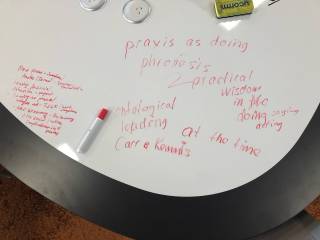Aims
The international collaborative research program ‘Pedagogy, Education and Praxis’ has three kinds of aims:
1. theoretical aims concerning the exploration and critical development of key concepts and associated understandings, from different educational and research traditions, of pedagogy, educational science and educational studies, and social and educational praxis and practice;
2. practical aims concerning the quality and transformation of educational praxis in settings including education, teacher education and the continuing professional development of teachers, in relation to a variety of contemporary educational problems and issues, as they emerge in a variety of educational contexts at different levels of education and in different national contexts; and
3. strategic aims of
- encouraging the dialogue between different traditions of theory, research and practice in education;
- encouraging reflexivity in this dialogue to help us understand the origins and formation of our own understandings, presuppositions and traditions;
- encouraging the development of critical praxis in pedagogy, aiming to foster the development of new kinds of transformative education and upbringing appropriate for the changed times and circumstances of late modernity; and
- fostering collaboration and the development of networks between scholars interested in these problems and issues across traditions.
Research questions
Research Question 1 asks: In our times, what constitutes educational praxis?
This question, although revised, maintains faith with the first of the 2008-2019 PEP Research Questions. Continuing to work on this question, in its revised form, is intended to allow the Network as a whole to continue to consider the relationships between the different intellectual traditions that inform our work as educators and pedagogues (for example, Pedagogik, Bildung, and Didaktik in different European traditions, Educational Studies and Education in different Anglophone traditions, and ‘Educación Popular’ and ‘Pedagogías Decoloniales’ in different Latin American traditions).
The notion of praxis includes a notion of the good for each person and the good for humankind. Through the notion of praxis, new Research Question 1 thus connects directly to the overarching question, ‘What, for our times, does it mean to live well in a world worth living in?’
Research Question 2: In our times, how are educational practices being differently enabled and constrained in our different national contexts?
This question will allow us to continue to explore the nature, evolution, and possible empirical interdependencies (in ecologies of practices) of the five key kinds of practices that together constitute the Education Complex (see Figure 1). All of these practices are to be found in the education lifeworlds and systems we explore in our different transnational, national, regional and local settings.
The overarching question ‘What, for our times, does it mean to live well in a world worth living in?’ suggests a source of criteria against which to critically interrogate both common world worth living in (this includes challenges for education in post-conflict/conflict contexts).
Research Question 3 will thus allow us to consider how to renew, for our times, the double purpose of education: to help people to live well in a world worth living in, thus explicitly addressing the overarching research question of ‘What, for our times, does it mean to live well in a world worth living in?’

